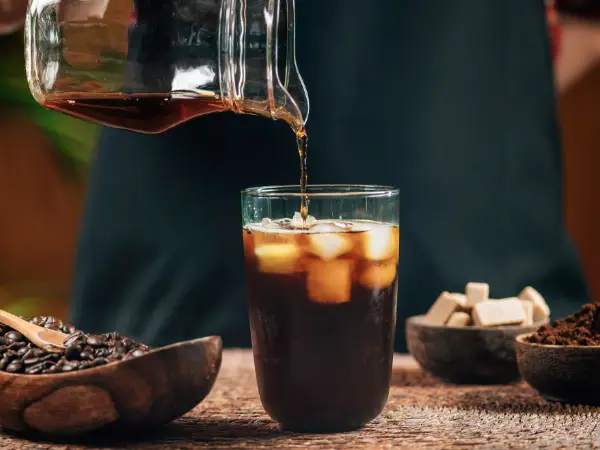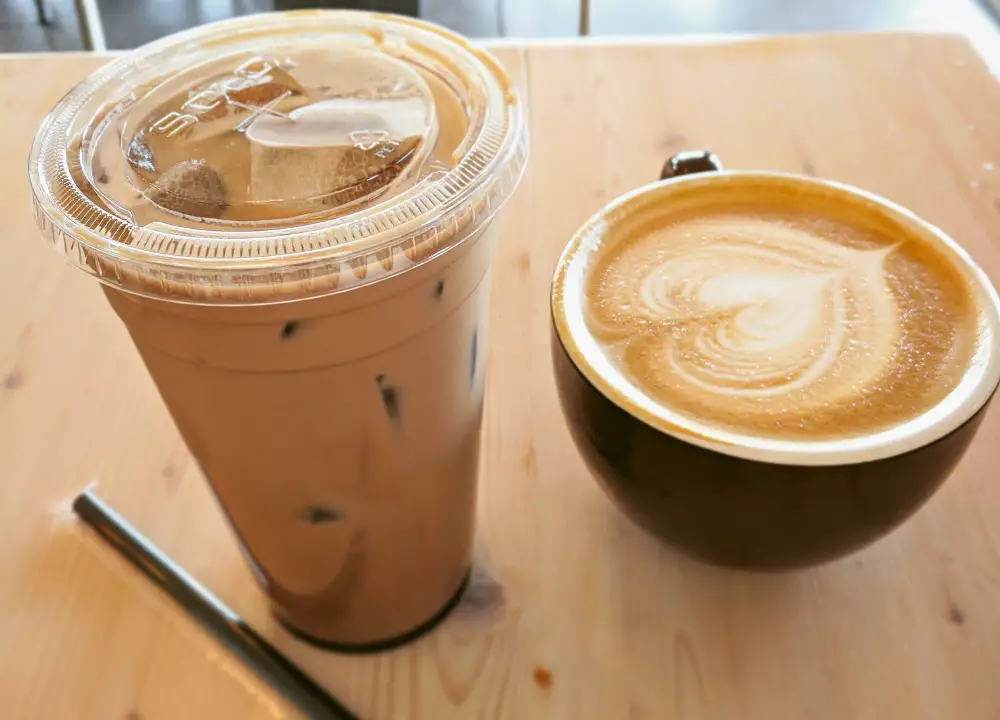Cold brew coffee stays fresh for up to 7-10 days if stored in the refrigerator. Proper storage ensures optimal flavor and freshness.
Learn how to store your cold brew, the ideal containers to use, and some tricks to maximize its shelf life. Keep reading to ensure every sip of your cold brew is as delicious as the first.
Understanding Cold Brew
Let’s dive into the nuances of cold brew, its storage, and tips to keep it tasting great.
What Is Cold Brew Coffee?
Cold brew coffee is made by steeping coarse coffee grounds in cold water for an extended period, usually 12-24 hours. This process results in a coffee concentrate that is less acidic and smoother than hot-brewed coffee. Here’s what makes cold brew unique:
- Temperature: Cold brew is made using cold or room temperature water, unlike traditional coffee that uses hot water.
- Time: It requires a longer brewing time, typically between 12 to 24 hours.
- Flavor: The slow extraction process produces a less bitter, smoother taste.
Many coffee lovers prefer cold brew for its mellow flavor and the ability to store it for longer periods. But how does it compare to regular coffee in terms of shelf life?
Cold Brew Vs. Regular Coffee: Does Shelf Life Differ?
The shelf life of cold brew coffee is generally longer than that of regular coffee. Here’s a quick comparison:
| Type | Storage Method | Shelf Life |
|---|---|---|
| Cold Brew Coffee | Refrigerated | Up to 2 weeks |
| Regular Coffee | Room Temperature | 12-24 hours |
| Regular Coffee | Refrigerated | 3-4 days |
Cold brew coffee’s extended shelf life is due to its brewing method and the lower temperature, which slows down oxidation and microbial growth. Here are some tips for maximizing the shelf life of your cold brew:
- Store it in an airtight container: This prevents oxidation and contamination.
- Keep it refrigerated: Always store cold brew in the fridge to maintain its freshness.
- Use fresh coffee grounds: Freshly ground coffee ensures better flavor and longer shelf life.
By following these storage tips, you can enjoy your cold brew coffee at its best for up to two weeks!
Freshness Factors
Many factors affect the freshness of cold brew coffee. Understanding these will help you enjoy a perfect cup every time.
Key Factors That Affect Cold Brew Coffee’s Shelf Life
Several key factors determine how long cold brew coffee stays fresh. Knowing these factors can help you extend its shelf life.
- Storage Temperature: Cold brew coffee should be stored in the refrigerator. Keeping it cold slows down the degradation process.
- Container Type: Use airtight containers made of glass or BPA-free plastic. This prevents oxidation and keeps the flavor intact.
- Brewing Method: The immersion method usually results in a longer shelf life. This is because it extracts fewer oils that can go rancid.
- Coffee-to-Water Ratio: A higher coffee concentration can help preserve the brew. Diluted cold brew tends to spoil faster.
The table below summarizes these factors:
| Factor | Impact on Shelf Life |
|---|---|
| Storage Temperature | Colder temperatures extend shelf life |
| Container Type | Airtight containers prevent oxidation |
| Brewing Method | Immersion method extends shelf life |
| Coffee-to-Water Ratio | Higher concentration preserves freshness |
What Impacts The Longevity Of Cold Brew Coffee?
Several factors impact how long cold brew coffee remains good.
- Exposure to Air: Air exposure leads to oxidation, which can make the coffee taste stale. Always use airtight containers to minimize air exposure.
- Light Exposure: Direct sunlight can degrade the coffee’s flavor. Store your cold brew in a dark place or use opaque containers.
- Contamination: Dirty containers or utensils can introduce bacteria, reducing shelf life. Ensure everything is clean before use.
- Ingredients Used: Fresh, high-quality coffee beans result in a longer-lasting brew. Using filtered water also helps maintain the coffee’s quality.
To keep your cold brew coffee fresh, follow these tips:
- Store in the refrigerator at all times.
- Use airtight, opaque containers to reduce exposure to air and light.
- Ensure all equipment is clean to avoid contamination.
- Use fresh coffee beans and filtered water for the best results.
By considering these factors, you can enjoy a fresh and delicious cup of cold brew coffee for longer periods.

Storing Cold Brew Coffee
Storing it properly ensures it stays delicious for as long as possible. Here are some tips and tricks to help you store your cold brew coffee effectively.
How To Store Cold Brew For Maximum Freshness
Storing cold brew coffee correctly can keep it fresh and flavorful for up to two weeks. Here are some essential tips to ensure your cold brew stays at its best:
- Use an Airtight Container: Always store your cold brew in an airtight container. This prevents oxidation and contamination, keeping the flavor intact.
- Refrigeration is Key: Cold brew should be stored in the refrigerator. This slows down any potential bacterial growth and maintains the coffee’s quality.
- Keep it Concentrated: Store the cold brew as a concentrate. Diluting it before storage can reduce its shelf life.
Temperature and light play vital roles in preserving cold brew. Here’s a simple table to illustrate ideal storage conditions:
| Storage Method | Temperature | Shelf Life |
|---|---|---|
| Refrigerated in an Airtight Container | Below 40°F (4°C) | 10-14 days |
| Room Temperature | 68-72°F (20-22°C) | 1-2 days |
Pro Tips for Optimal Storage:
- Label the Container: Note the date you made the cold brew. This helps you keep track of its freshness.
- Use Dark Glass Bottles: If possible, use dark glass bottles. They protect the coffee from light, which can degrade the flavor.
- Avoid Plastic Containers: Plastic can sometimes impart unwanted flavors to the coffee. Glass or stainless steel are better choices.
Following these tips will help you enjoy your cold brew coffee at its best. Proper storage ensures you savor every sip with maximum freshness and flavor.
Signs Cold Brew Has Gone Bad
Knowing the signs your cold brew has gone bad is crucial. This ensures you enjoy your coffee at its best and avoid any unpleasant or unsafe experiences.
How To Tell If Your Cold Brew Coffee Has Spoiled
Detecting spoiled cold brew is simple if you know what to look for. Several signs indicate your cold brew has turned bad. Here are some key indicators:
- Off Smell: Fresh cold brew has a rich, inviting aroma. If it smells sour or strange, it’s time to toss it.
- Unpleasant Taste: Spoiled cold brew tastes off. It might be bitter, sour, or just different from the smooth flavor you’re used to.
- Cloudy Appearance: Fresh cold brew is clear. If it appears cloudy or murky, it’s likely gone bad.
- Mold Growth: Check for any visible mold. Mold can appear as spots or a film on the surface.
- Separation: If your cold brew separates into distinct layers, it might be spoiled. Give it a good shake and taste test to be sure.
Use this table to quickly check for signs of spoilage:
| Sign | Description |
|---|---|
| Off Smell | Sour or strange aroma |
| Unpleasant Taste | Bitter, sour, or unusual flavor |
| Cloudy Appearance | Murkiness in the coffee |
| Mold Growth | Visible spots or film |
| Separation | Distinct layers forming |
By paying attention to these signs, you can ensure your cold brew is always fresh and enjoyable. Always store it properly to extend its shelf life and savor every sip.
How Long Does Cold Brew Coffee Last?
Let’s dive into how long cold brew coffee lasts and some handy storage tricks.
How Long Does Cold Brew Last In The Fridge?
Cold brew coffee can last quite a while in the fridge. Properly stored cold brew can stay fresh for up to two weeks. Here are some tips to keep your cold brew at its best:
- Use an airtight container: This prevents oxidation and keeps the coffee fresh.
- Keep it cold: Always store your cold brew in the fridge to maintain its flavor.
- Avoid direct sunlight: Sunlight can degrade the coffee, affecting its taste.
Here is a table summarizing the shelf life of cold brew under different conditions:
| Storage Method | Shelf Life |
|---|---|
| Room Temperature | 12-24 hours |
| Refrigerated in Airtight Container | Up to 2 weeks |
| Refrigerated in Open Container | 1-2 days |
Always taste your cold brew before drinking. If it tastes sour or off, it’s best to discard it. Freshness matters, and following these tips will help you enjoy your cold brew longer.
Shelf Life Of Homemade Vs. Store-bought Cold Brew
Homemade and store-bought cold brews have different shelf lives. Here’s a comparison:
- Homemade Cold Brew: Typically lasts up to two weeks if stored properly in the fridge. Always use fresh, quality beans and filtered water for the best results.
- Store-Bought Cold Brew: Often has preservatives that extend its shelf life. It can last from a few weeks to a month, depending on the brand.
The table below highlights the differences:
| Cold Brew Type | Shelf Life |
|---|---|
| Homemade | Up to 2 weeks |
| Store-Bought | Few weeks to a month |
Always check the expiration date on store-bought cold brew. For homemade, label the container with the date you made it. This helps you keep track and enjoy your cold brew at its freshest.
Extending Shelf Life
Understanding the shelf life and how to extend it can ensure you enjoy its rich flavor longer. Below, we explore some effective strategies to maximize the freshness of your cold brew.
Tips For Extending The Shelf Life Of Cold Brew
Proper storage is key to extending the shelf life of cold brew coffee. Here are some tips to help you keep your cold brew fresh:
- Refrigeration: Always store your cold brew in the refrigerator. This can help keep it fresh for up to two weeks. The cold temperature slows down the oxidation process, preserving the flavor.
- Airtight Containers: Use airtight containers to store your cold brew. Exposure to air can lead to quicker oxidation and spoilage. Mason jars and specialized cold brew containers are excellent options.
- Concentrate Storage: If you make a cold brew concentrate, it typically lasts longer than diluted cold brew. Store the concentrate and only dilute it when you’re ready to drink.
- Filtered Water: Using filtered water to make your cold brew can help extend its shelf life. Impurities in tap water can affect the flavor and longevity.

